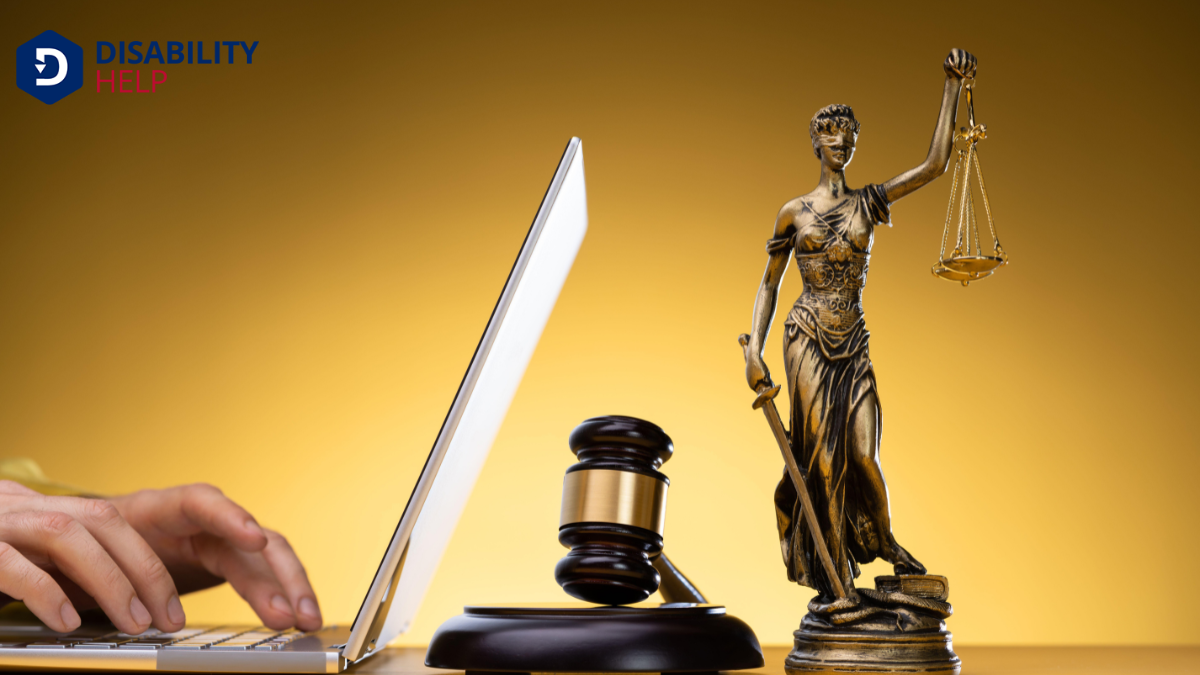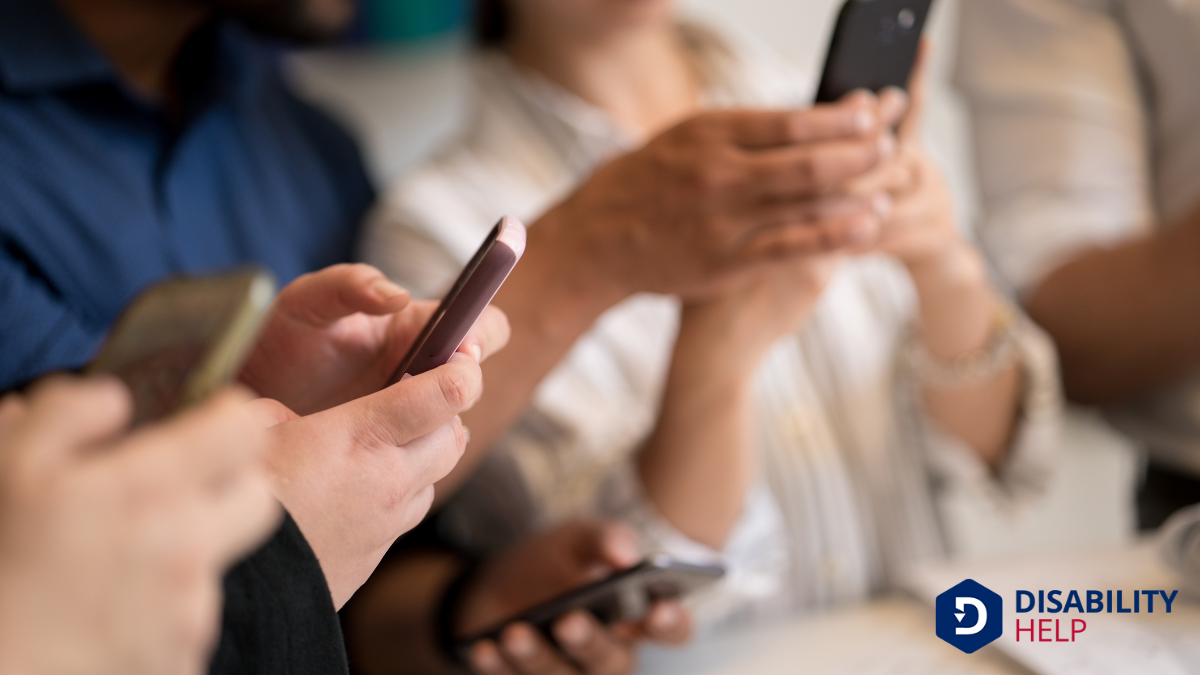When we consider whether there are protections against disability discriminationUnfair treatment of individuals based on their disability in areas such as employment, education, an... on social media platforms, it's essential to recognize the role of existing legal frameworks like the ADA and the RehabilitationThe process of helping individuals with disabilities achieve and maintain their optimal physical, se... Act. These laws aim to guarantee accessibilityThe design of products, devices, services, or environments to be usable by people with disabilities.... and inclusivity online. Many platforms have also taken steps to implement policies and features to combat discrimination. However, the question remains: are these measures truly effective, or is there more work to be done?
Key Takeaways
- Social media platforms implement policies and reporting tools to address disability discrimination.
- The ADA and Rehabilitation Act provide legal protection against online disability discrimination.
- Accessibility features like captioning and screen readerSoftware that reads aloud the text on a computer screen, used by individuals who are blind or visual... compatibility are essential for inclusivity.
- Lack of robust enforcement mechanisms allows discriminatory practices to persist on social media.
- AdvocacyThe act of arguing in favor of, supporting, or defending the rights and interests of individuals or ... for policy reforms and enhanced protections is crucial for creating inclusive digital spaces.
Understanding Disability Discrimination in the Digital Space
Although social media connects us in unprecedented ways, it also presents challenges, particularly around disability discrimination. As we navigate digital spaces, we encounter instances where individuals with disabilities face exclusion or harassment.
This discrimination often manifests in subtle forms, such as inaccessible content, lack of representationThe way people with disabilities are depicted in media, culture, and politics, often influencing pub..., or outright bullying. We must recognize that these actions can greatly impact a person's mental health and sense of belonging.
Understanding disability discrimination online requires us to listen and learn from those who experience it. Recognizing biases and stereotypes helps us become better allies.
We should ask ourselves how our actions and content might affect others. By fostering inclusive environments, we can work together to create a more supportive and equitable digital space for everyone.
Legal Frameworks Addressing Online Disability Discrimination

As we explore the ways to combat disability discrimination on social media, it's essential to recognize the role of existing anti-discrimination laws.
These laws set the foundation for protecting individuals with disabilities, but we also need to take into account platform-specific policies that address unique challenges in the digital domain.
Existing Anti-Discrimination Laws
When we plunge into the sphere of anti-discrimination laws, it's clear that several legal frameworks are designed to address online disability discrimination.
The Americans with Disabilities Act (ADA)A U.S. law that prohibits discrimination against individuals with disabilities in all areas of publi... stands as a cornerstone, prohibiting discrimination against individuals with disabilities in various areas, including online activities. Though initially conceived for physical spaces, its principles often extend to digital domains.
The Rehabilitation Act, particularly Section 504A provision of the Rehabilitation Act of 1973 that prohibits discrimination based on disability in p..., also plays a vital role in ensuring accessibility for those using federally funded programs or services online.
Globally, the United Nations' Convention on the Rights of Persons with Disabilities (CRPD)An international treaty that promotes and protects the rights of people with disabilities. advocates for internet accessibility and non-discrimination.
These legal frameworks aim to hold online entities accountable, pushing for inclusivity and accessibility. Together, they forge a path toward equitable online spaces for everyone.
Platform-Specific Policies
Many social media platforms have developed specific policies to combat online disability discrimination, aiming to create more inclusive digital environments. We see companies like Facebook, Twitter, and Instagram implementing guidelines that prohibit discriminatory behavior, ensuring that users with disabilities feel safe and respected.
These platforms often include reporting tools that allow us to flag discriminatory content quickly. By doing so, we're helping maintain a respectful online community.
Additionally, platforms frequently update their policies, reflecting evolving societal standards and legal requirements. This ongoing commitment means they’re not just reactive but proactive in addressing discrimination.
We can also find educational resources that inform users about respectful interactions and the importance of equityFairness and justice in the way people are treated, especially in the allocation of resources and op.... Embracing these policies helps us all contribute to a more inclusive online space.
Social Media Platform Policies and Accessibility Features
While traversing the vast world of social media, it's crucial to examine the platform policies and accessibility features that impact users with disabilities.
These elements shape how inclusive and user-friendly these platforms are. Let's explore some key aspects:
- Captioning and Transcripts: Many platforms offer automatic captioning for videos, but the accuracy varies. Providing transcripts for audio content can further enhance accessibility.
- Screen Reader Compatibility: Platforms must guarantee their interfaces work seamlessly with screen readers, enabling visually impaired users to navigate content independently.
- Customizable Interfaces: Adjustable font sizes, color contrasts, and keyboard navigation empower users to tailor their experience to their needs.
The Role of Technology Companies in Promoting Inclusivity
As we explore the role of technology companies in promoting inclusivity, it's vital to recognize their responsibility in creating accessible digital landscapes. These companies have the power to shape how we interact with the world online.
By prioritizing accessibility, they can guarantee that everyone, regardless of ability, can participate fully in digital spaces.
To foster inclusivity, tech companies need to integrate accessibility features from the start. This means considering diverse needs during the design and development phases.
Features like screen readers, voice commands, and customizable interfaces should be standard, not afterthoughts.
When companies lead with inclusivity, they help dismantle barriers that prevent users with disabilities from engaging.
Together, we've the opportunity to advocate for change and hold these companies accountable.
Challenges Faced by Users With Disabilities on Social Media

As we explore the challenges users with disabilities face on social media, it's clear that the lack of robust accessibility features limits their experiences.
Inadequate content moderation often fails to protect these users from harmful interactions, further isolating them.
Additionally, communication barriers persist, making it difficult for them to engage fully and equally in online communities.
Accessibility Features Lacking
Despite the advancements in technology, social media platforms still fall short when it comes to accessibility features for users with disabilities. We need to understand the specific challenges these users face daily.
Many platforms lack thorough tools that cater to all users' needs. Here's where they often fall short:
- Screen Reader Compatibility: Not all platforms fully support screen readers, making it difficult for visually impaired users to navigate and interact with content.
- Captioning and Transcription: Videos frequently lack accurate captions or transcriptions, excluding those with hearing impairments from engaging with multimedia content.
- Customizable Interfaces: Limited options for adjusting text size, color contrast, or navigation methods can deter users with various disabilities from fully participating.
Addressing these gaps is essential for creating inclusive digital spaces where everyone can connect and communicate effectively.
Inadequate Content Moderation
Although social media platforms have made strides in various areas, inadequate content moderation remains a significant hurdle for users with disabilities.
We often encounter challenges where harmful or discriminatory content slips through the cracks. This oversight can lead to an environment that feels unwelcoming and even hostile. Moderators sometimes lack the training to recognize and address content that targets individuals with disabilities, leaving many of us feeling vulnerable and unsupported.
We need platforms to prioritize thorough training for their moderators, ensuring they’re equipped to handle diverse needs effectively.
Communication Barriers Persist
While social media has connected us in unprecedented ways, significant communication barriers still persist for users with disabilities. We must acknowledge these challenges to foster a more inclusive online environment.
- Inaccessible Content: Many platforms still lack adequate support for screen readers or captions, limiting access for visually or hearing-impaired users. This oversight can leave individuals feeling excluded from digital conversations.
- Complicated Navigation: Social media interfaces can be complex and not always compatible with adaptive technologies. This can make it difficult for those with physical or cognitive disabilities to engage fully.
- Lack of Customization: Users often have limited options to adjust settings for better accessibility, preventing them from tailoring their experience to meet personal needs.
Evaluating the Need for Policy Reforms and Enhanced Protections
As we explore the pressing issue of disability discrimination on social media, it's vital to evaluate the urgent need for robust policy reforms and enhanced protections.
We recognize that without effective policies, discriminatory practices can persist, creating barriers for individuals with disabilities. Current policies often lack clarity and enforcement, leaving users vulnerable.
We believe it's important to advocate for thorough reforms that address these gaps. Social media platforms should implement clear guidelines and stronger enforcement mechanisms.
By doing so, they can create a safer, more inclusive environment. Let’s push for policies that guarantee accessibility and actively combat discrimination.
Together, we can influence change and promote a culture of respect and equality on social media platforms, making sure everyone’s voice is heard and valued.
Frequently Asked Questions
How Can Individuals Report Disability Discrimination on Social Media?
Let's report disability discrimination by using the platform's reporting tools. We'll select the appropriate category, provide details, and submit. It's essential to stand together, ensuring everyone's voice is heard and advocating for an inclusive environment.
Are There Specific Platforms More Prone to Disability Discrimination?
We can't pinpoint specific platforms more prone to disability discrimination, but some have faced criticism for it. Let's focus on reporting issues and encouraging positive interactions to foster a more inclusive online environment for everyone.
What Are the Consequences for Users Who Discriminate Against Disabled Individuals Online?
Let's explore the consequences users face for disability discrimination online. Offenders might experience account suspension, content removal, or permanent bans. It's essential we report such behavior to foster a more inclusive and respectful digital environment for everyone.
How Effective Are Current Algorithms in Detecting Disability Discrimination?
We recognize the limitations of current algorithms in effectively detecting disability discrimination. They're improving, but they often fail to grasp context and nuances. Let's advocate for better technology and policies to guarantee inclusivity and fairness online.
Can Social Media Influencers Play a Role in Advocating for Disability Rights?
We can definitely encourage influencers to advocate for disability rightsThe legal and human rights afforded to individuals with disabilities, often the focus of advocacy an.... They have a powerful voice and reach, which can raise awareness and drive change. Let's support and amplify their efforts to foster a more inclusive online community.
Conclusion
In traversing the digital landscape, we must recognize our shared responsibility to guarantee social media platforms are inclusive for everyone. While legal frameworks like the ADA provide a foundation, it's essential that we push for robust enforcement and continuous improvement of platform policies. Through collaboration and advocacy, we can drive meaningful change, making certain users with disabilities experience a safe, equitable online environment. Let’s work together to demand and create the inclusive digital spaces everyone deserves.






